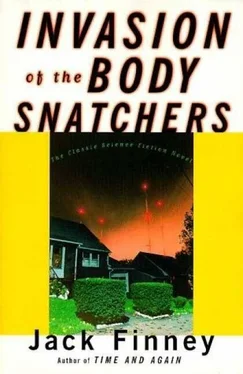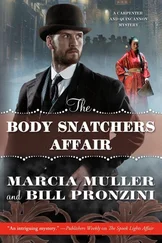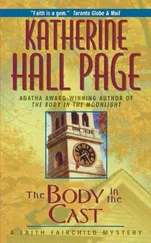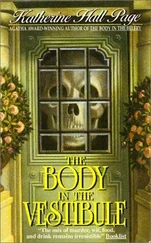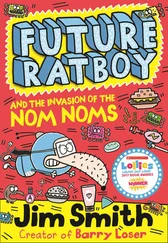Both of us scanned the front page, glancing carefully at each story; there was nothing there about giant seed pods or Professor L. Bernard Budlong, and I turned the page. In the upper left-hand corner of page three was a rectangular hole, two columns wide by five or six inches deep; a news story had been neatly sliced out with a razor blade, and Becky and I glanced at each other, then scanned the rest of that page, and page two. We found nothing of what we were looking for, nor did we find it in the remaining three pages of the May 8 Tribune .
We turned to the May 7 issue and began with page one. There was nothing in the paper about Budlong or the pods. On the bottom half of the May 6 Tribune 's first page was a hole seven or eight inches long and three columns wide. On the bottom half of the May 5 issue was another hole, just about as long, but only two columns wide.
It wasn't a guess, but a sudden stab of direct, intuitive knowledge – I knew , that's all – and I swung in my chair to stare across the room at Miss Wyandotte. She stood motionless behind the big desk, her eyes fastened on us, and in the instant I swung to look at her, her face was wooden, devoid of any expression, and the eyes were bright, achingly intent, and as inhumanly cold as the eyes of a shark. The moment was less than a moment the flick of an eyelash – because instantly she smiled, pleasantly, inquiringly, her brows lifting in polite question. "Anything I can do?" she said with the calm, interested eagerness typical of her in all the years I had known her.
"Yes," I said. "Would you come here, please, Miss Wyandotte?"
Smiling brightly, she walked around her desk and crossed the room toward us. There was no one else in the library now; it was twenty-six minutes past twelve by the big old clock over her desk, and the only other patron had left a few minutes before.
Miss Wyandotte stepped beside me, I glanced up at her, and she stood looking down at me, her expression pleasantly inquiring. I nodded at the hole on the front page of the newspaper before me. "Just before you brought us this file," I said quietly, "you cut out all references to the seed pods found here last spring, didn't you?"
She frowned – bewildered by this accusation – and leaned forward to stare down in surprise at the mutilated paper on the low round table.
Then I stood up to face her, my face a few inches from hers. I said, "Don't bother, Miss Wyandotte, or whatever you are. Don't bother to put on an act for me." I leaned closer, staring her directly in the eyes, and my voice dropped. "I know you," I said softly. "I know what you are."
For a moment she still stood, glancing helplessly from me to Becky in utter bewilderment; then suddenly she dropped the pretence. Grey-haired Miss Wyandotte, who twenty years ago had loaned me the first copy of Huckleberry Finn I ever read, looked at me, her face going wooden and blank, with an utterly cold and pitiless alienness. There was nothing there now, in that gaze, nothing in common with me; a fish in the sea had more kinship with me than this staring thing before me. Then she spoke. I know you, I'd said, and now she replied, and her voice was infinitely remote and uncaring. "Do you?" she said, then turned on her heel and walked away.
I gestured at Becky, she stood, then we walked on out of the library. Outside, on the sidewalk, we took half a dozen steps in silence, then Becky shook her head. "Even her," she murmured, "even Miss Wyandotte," and the tears shone in her eyes. "Oh, Miles," she said softly, and glanced around, first over one shoulder, then the other, at the houses, quiet lawns, and the street beside us, "how many more?" I didn't know the answer to that, and I just shook my head, and we walked on, toward Becky's house.
There was a car parked in front of Becky's, and as we approached, we recognized it: a 1947 Plymouth sedan, the blue paint faded from the sun. "Wilma, Aunt Aleda, and Uncle Ira," Becky murmured, and looked at me. Then she said, "Miles" – we were almost at the house, and she stopped on the sidewalk – "I can't go in there!"
I stood for a moment, thinking. "We won't go in," I said then, "but we've got to see them, Becky." She started shaking her head, and I said, "We've got to know what's going on, Becky! We have to find out! Or we might as well not have come back to town." I took her arm, and we turned in at the brick walk leading up to the house, but I stepped off it immediately, pulling Becky off, too, and we walked in silence on the lawn beside it. "Where would they be?" I said. When she didn't answer, I shook her once, almost roughly, my hand still on her arm. "Becky, where would they be? The living-room?"
She nodded dumbly, and we walked silently around to the side of the house, and the wide old porch that passed under the living-room windows. The windows were open, we heard the murmur of voices behind the white living-room curtains, and I stopped, lifted a foot, pulled off my shoe, then took off the other. I glanced down at Becky, and she swallowed; then, holding to my arm, she pulled off her high-heeled pumps, and just beyond the living-room windows, toward the back of the house, we crept silently up the porch stairs. Then, beside the open window, we sat down on the porch, very carefully and slowly. We were out of sight, completely sheltered from the street by the big old trees and high shrubbery of the lawn.
"… like some more coffee?" we heard a voice, Becky's father, saying.
"No," said Wilma, and we heard the clink of a cup and saucer set down on a wood surface, "I've got to be back at the shop by one. But you and Uncle Ira can stay, Aunt Aleda."
"No," Wilma's aunt replied, "we'll get along, too. Sorry to have missed seeing Becky."
I moved my head to bring an eye just above the window sill, at the side of the open window. There they sat: Becky's grey-haired father, smoking a cigar; round-faced, red-checked Wilma; tall old Uncle Ira; and the tiny, sweet-faced old lady who was Wilma's aunt; all of them looking and sounding precisely the way they always had. I turned to glance at Becky, wondering if we hadn't made some terrible mistake, and if these people weren't just what they seemed.
"I'm sorry, too," Becky's father replied. "I thought surely she'd be home; she's back in town, you know."
"Yes, we know," said Uncle Ira, "and so is Miles," and I wondered how they could possibly know we were back, or that we'd even been gone. Then something happened, without warning, that made the hair on the back of my neck prickle and stand erect.
This is very hard to explain, but – when I was in college, a middle-aged Negro had a shoeshine stand, on the sidewalk before one of the older hotels, and he was a town character. Everyone patronized Billy, because he was everyone's notion of what a "character" should be. He had a title for each regular customer. "Mornin', Professor," he'd say soberly to a thin glasses-wearing businessman who sat down for a shoeshine each day. "A greetin' to you, Captain," he'd say to someone else. "Howdydo, Colonel," "Nice evenin', Doctor," "General, I'm pleased to see you." The flattery was obvious, and people always smiled to show they weren't taken in by it; but they liked it just the same.
Billy professed a genuine love for shoes. He'd nod with approving criticalness when you showed up with a new pair. "Good leather," he'd murmur, nodding with a considered conviction, "pleasure to work on shoes like these," and you'd feel a glow of foolish pride in your own good taste. If your shoes were old, he might hold one cupped in his hand when he'd finished with it, twisting it a little from side to side to catch the light. "Nothin' takes a shine like good aged leather, Lieutenant, nothin' ." And if you ever showed up with a cheap pair of shoes, his silence gave conviction to his compliments of the past. With Billy, the shoe-shine man, you had the feeling of being with that rarest of persons, a happy man. He obviously took contentment in one of the simpler occupations of the world, and the money involved seemed actually unimportant. When you put them into his hands, he didn't even look at the coins you had given him; his acceptance was absent-minded, his attention devoted to your shoes, and to you, and you walked away feeling a little glow, as though you'd just done a good deed.
Читать дальше
